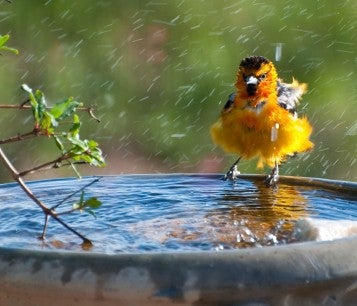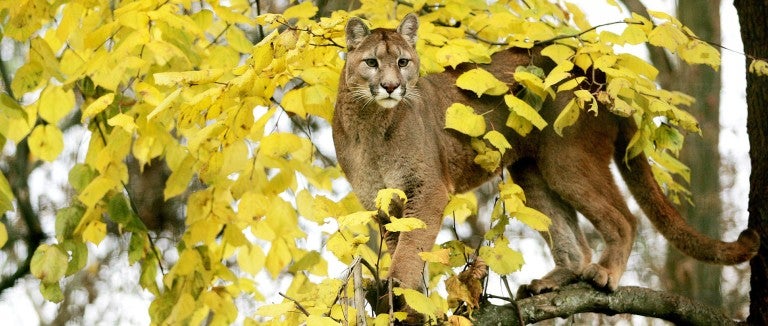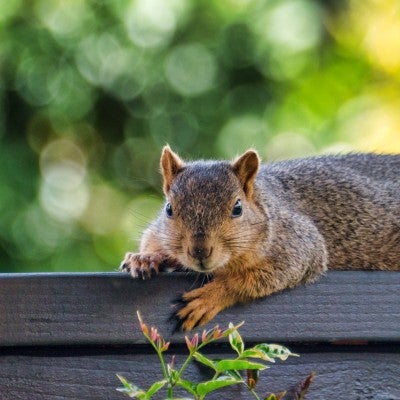Once robust, populations of cougars (also known as mountain lions or pumas) have declined drastically across most of their range in the Americas. The population decline is due to the impact of extensive hunting and predator control, in addition to continued habitat loss and fragmentation. Cougars are secretive and rarely seen, adapting even to extensive human encroachment into their territories.
Learn More About Mountain Lions
Understanding cougars and their habits, along with recognizing that they are our wild neighbors is the first step toward coexisting with them. Simply seeing a cougar, or signs that a cougar was in the area, isn't reason for alarm.
Contents
- How can we prevent conflicts with cougars?
- How can I protect my pets from mountain lions?
- How can I protect livestock from mountain lions?
- Why doesn't killing solve conflicts with cougars?
- How can I recreate safely in cougar country?
- What do I do if I encounter a cougar?
- What do I do if a cougar attacks?
No matter how big or small your outdoor space, you can create a haven for local wildlife. By providing basic needs like water, food and shelter, you can make a difference in your own backyard.

How can we prevent conflicts with cougars?
If you live in or near a cougar habitat, making a few changes to your landscape and your behavior can significantly reduce your chances of drawing in unwanted wild visitors—not only cougars, but also bears, coyotes and wolves.
- Store trash in clean, well-secured containers. Wash trash cans to avoid attracting potential prey species such as raccoons.
- Don’t leave pet food outside. Either feed pets indoors or remove food immediately after they’ve eaten.
- Don’t feed deer or other wildlife that may attract cougars.
- Don’t compost meat scraps or other foods that would attract cougars or their prey.
- Trim vegetation around your house to avoid providing concealment for cougars as they rely on cover to ambush their prey. Your yard need not be completely barren, but it shouldn't include dense underbrush that would allow a cougar to hide undetected.
- Seal open areas under structures like porches, sheds and decks that can provide shelter for cougars or their prey.
- Install lighting or motion-sensor lighting in dark areas around the home to deter cougars and other wildlife.
How can I protect my pets from mountain lions?
Cougars pose only a small risk to pets, but those risks can be minimized with some common sense and preventative measures.
- Keep cats indoors and always supervise small pets when outside, especially from dusk to dawn. Be aware that cougars can jump 18 feet, so most fences will not protect unsupervised pets outside.
- Keep small pets such as rabbits or guinea pigs inside or in a secure enclosure that is covered on top.
- Minimize brush and cover in your yard that can provide hiding places for cougars.
- Walk your dog on a leash 6 feet long or less.
How can I protect livestock from mountain lions?
While some livestock growers lose an occasional animal to cougars, the numbers are quite small. Many more livestock are lost every year to weather, birthing problems, theft or disease rather than to predation by cougars. Still, there are measures that you can take to reduce this risk.
- Keep livestock in pastures away from ambush cover (such as shrubs).
- Synchronize the birth of calves and lambs with native prey (deer and elk) births.
- Fence in your livestock to keep them contained.
- Keep small livestock (such as chickens) in secure enclosures that are covered on top, making sure that these enclosures are also secured against intrusions from wildlife like raccoons that might attract cougars.
- Consider using a guard animal especially for larger properties. Donkeys, llamas and certain breeds of dogs have been known to successfully guard livestock.
- Where possible, place livestock in enclosed sheds or barns at night.
Why doesn't killing solve conflicts with cougars?
Cougars are killed by trophy hunters in nearly every state where they are found. State wildlife management agencies and the U.S. Department of Agriculture’s Wildlife Services program also often kill nuisance cougars. But because killing cougars disrupts their social structure and may exacerbate conflicts with humans and livestock, it is not a viable solution. Killing cougars does nothing to prevent future cougar attacks or make people and livestock safer.
How can I recreate safely in cougar country?
When living or engaging in recreational activity (such as hiking, skiing, snowshoeing, horseback riding, etc.) in cougar country, the best way to prevent a conflict with a cougar is to take a few extra precautions.
- Take a friend with you; avoid venturing into cougar country alone.
- Be aware of your surroundings (e.g. don’t wear headphones).
- Bring along a whistle or an air horn that could help scare away wild animals you may encounter.
- Keep children under the age of 16 close and don’t allow young children to play outdoors unsupervised. Walk with children between two adults or hold them by the hand.
- Keep your dog on a leash 6 feet long or less.
What do I do if I encounter a cougar?
- Don’t run! Running will provoke the predatory chasing behavior of cougars, as it would with other predators such as bears, coyotes and wolves.
- Pick up small children or pets that are with you.
- Directly face the cougar, but look at the cougar’s feet, not directly into their eyes, to avoid appearing aggressive.
- If the cougar displays aggressive behavior try to appear larger—raise your arms or open your jacket over your head.
- Make noise by yelling, blowing a whistle or an air horn.
- If you have an umbrella, quickly open and close it while facing the cougar.
- Do not approach the cougar. Give it ample space to run away—don’t corner it.
- If there are cubs, be careful not to get between them and their mother.
What do I do if a cougar attacks?
In the very rare event that you are attacked by a cougar, fight back in any way that you can. People have stopped attacks by hitting the cougar with sticks, their hands, baseball caps and garden tools.
There are no repellents that have been registered for use on cougars, but the pepper (capsaicin) sprays sold to deter attacks by dogs, bears and people or even a fire extinguisher may be effective.

